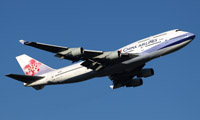Year End Review: Environment
Asia leads from the front
December 1st 2012
The environment headlines were dominated during the year with the row between the European Union (EU) and the rest of the world over its emissions trading scheme, which was suspended last month. Read More »
 |
| China Airlines: two world firsts this year |
But elsewhere, companies and airlines in the Asia-Pacific were busy working in their own ways to improve the airline industry’s contribution to “greener skies”.
In August, the Commercial Aircraft Corporation of China (COMAC) and Boeing opened an aviation energy conservation and emission reduction technology centre in Beijing. It is currently researching how to treat and clean used cooking oil to use as jet fuel. Boeing is also researching other biofuel materials, such as jatropha oil, with other institutes in China.
Earlier this year, the Chinese government announced it would invest $8.04 million in flag carrier, Air China, for engineering and fuel efficiencies. The funds were to install winglets on the carrier’s fleet and rationalize fuel use where possible. Air China was the first Mainland Chinese airline to operate a flight using biofuels.
* In April, an All Nippon Airways (ANA) B787 delivery flight completed a transpacific flight partly powered by biofuels. The Dreamliner flight between Seattle and Haneda airport, Tokyo, used a biofuel produced mainly from cooking oil. Emissions were reduced by 10%. ANA was the launch customer for the B787.
* In mid-year, Taiwan’s China Airlines (CAL) began operating the world’s first transpacific climate observation flight. The A340-300 is equipped with a sampling port extending from its fuselage which collects data on atmospheric gases, water vapour, ozone, carbon monoxide and nitrogen oxide during each flight.
The flights are in support of the Pacific Greenhouses Gases Measurement Project (PGGM), jointly run by Taiwan’s Environmental Protection Administration, the National Science Council and Taiwan’s National Central University.
In October, CAL achieved another world first when it began labelling carbon footprint and calorie content of its inflight meals on the PGGM plane on services between Taipei and Frankfurt.
* Cathay Pacific Airways will ban sharks’ fins from its cargo flights from this month. “Due to the vulnerable nature of sharks, their rapidly declining population and the impact of over fishing for their parts and products, our carriage of [the sharks’ fins] is inconsistent with our commitment to sustainable development,” said an airline statement.